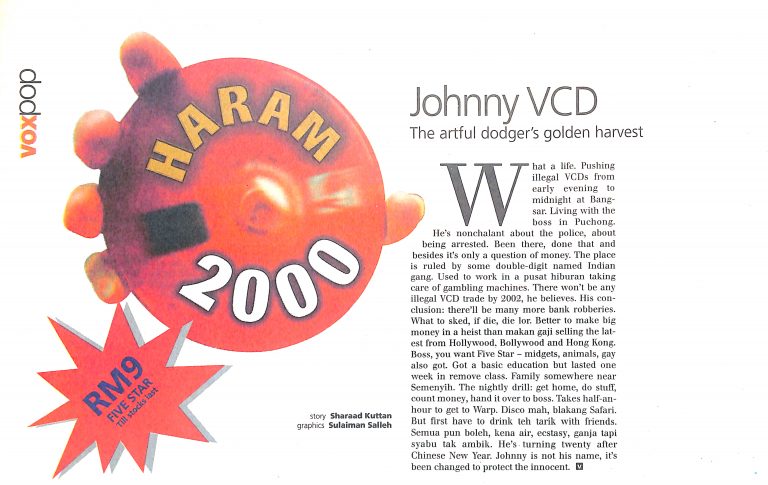When I rejoined The Sun in 1999 (having worked there in 1995 for half a year), I was hired to work on the sub-editors desk. Soon was transferred to the weekend supplement, Vox led by Jason Tan, a young self-assured editor with a sense of the style. His editorial direction meant that we could work on substantive issues but we needed to deliver them in a clever, often tongue-in-cheek fashion.
Johnny VCD was for the regular “Vox Pop” segment — meant to be vignettes of city life delivered with flair. It arose from a casual conversation I had with a seller of pirated VCDs on one of the Telawi roads in Bangsar. It wasn’t a formal interview but the segment didn’t require it to be so I could rely on my mental notes and my imagination to reconstructed it. Did I do much embellishing? I don’t think so.
Johnny VCD was a portrait of urban working-class angst.
Looking back on the hundreds of conversations I have had with strangers, my biggest regret is not documenting them more systematically. Turning it into a project. Even today, looking back, I am reminded of how much the language, dispositions and opinions of these strangers added to the bewildering tapestry of life in the Klang Valley with its radically different yet intersecting trajectories. Perhaps I was too busy chasing other stories to recognise the gems I had in these chance encounters.
Bangsar was one of those places were different worlds intersected.
This young working-class Chinese VCD seller had strong views about the future of VCD sales, the shifting nature of work and his place in the world. He was clearly right about the fate of the shiny VCD dics, an insight I had no way to evaluate at that point. However it was the disconnect between our worlds fascinated me. My world was that of the culturally and socially aspirational who turned up for art show openings at Valentine Willie Art Gallery or hung out at Alexis paying extraordinary prices for a tasty bowl of Sarawak Laksa on Jalan Telawi 3, Bangsar.
